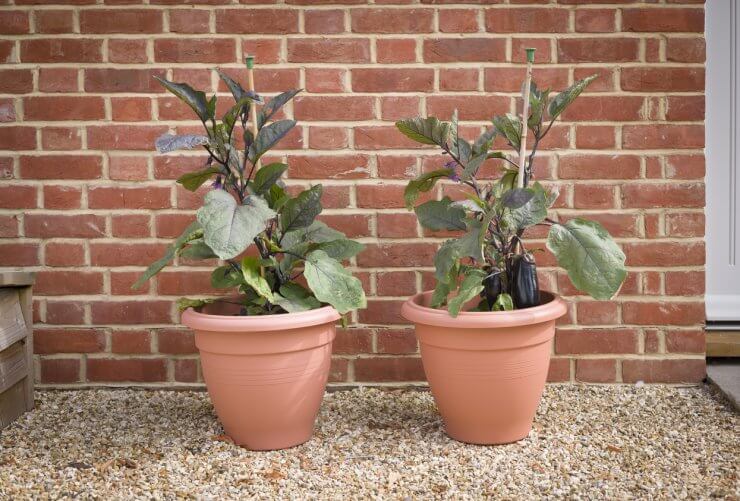
Eggplants growing in containers
Eggplants thrive in containers. They like the warmth and moisture retention, and the small varieties can even be hand-pollinated and grown in indoor hydroponic gardens during the winter. If you’re unsure whether you want to grow eggplants in a raised bed or a container, I say try both and see which environment suits them in your climate!
As a precaution, it’s best to start your seeds indoors. While tropical climates can lend to easy seed-sowing directly, you’ll always have more control indoors and more likely a better outcome. Eggplants have no trouble being transplanted so it’s a win-win with less risk.
Light
Eggplants need at least six hours of sunlight each day to flourish. They can tolerate some shade, but the more sun, the bigger and better your eggplants will become. And if you’re growing mini eggplants, you still want lots of sun because they’ll taste better too! Putting your container on wheels is one way to help your eggplants get the sunlight they need. Just move them when you need to.
Water
Water, sunlight, and soil are all essential ingredients for a successful eggplant harvest. Watering is one of the easiest things to do—and therefore one of the easiest things to overdo. Eggplants need at least 1 inch of water per week. You can supplement whatever nature does not provide. Wherever they’re planted, they need soil that stays warm and moist but not wet, and that includes containers! You can mulch the soil around your eggplants to help retain some moisture; also make sure your container has adequate drainage. Just don’t kill your crop with kindness—water just enough, but no more. Too much water can invite disease, and you want to keep your eggplants healthy—leaves, roots, and all!
Soil
Drainage is the trickiest thing you must worry about when it comes to container gardening. While eggplants like the warmth and moisture of a container garden, a week of rain is still too much for your poor plant. To avoid soaking your eggplants, make sure you have a planter with drainage holes, and use a mixture that is 1/3 sand and 2/3 enriched potting soil meant for fruiting plants like eggplants. This gives your plants a healthy head start, and you’re less likely to introduce weeds or soilborne diseases by digging up soil from your garden.
Use a time-released fertilizer when you plant and throughout the growing season for your eggplants. It’s certainly best to test your soil to see what you might need first, but if you’re starting with fresh enriched soil like Miracle-Gro, you likely won’t need to add anything to start. When you do fertilize, use a 10-10-10 mix.
Have you grown eggplants in containers? Please tell us about your successes and challenges growing eggplants in containers.


 Previous
Previous


Miracle-Gro is crap. I’ve had good success with eggplants in grow bags and never use harsh artificial fertilizers. As soon as I saw Miracle-gro I stopped reading.